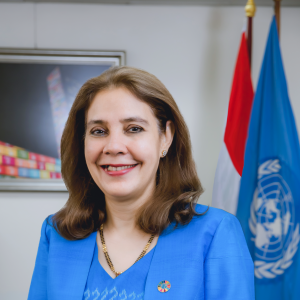Middle-Income Countries Conference 2025
Thematic Panel Discussion 4
New Generation Partnerships with the UN Development System
Manila, 28-29 April 2025
It is a pleasure to discuss the UN’s new generation of partnerships with middle-income countries to support their ambitious development trajectories.
I would like to frame my intervention from the perspective of Indonesia where I serve as the UN Resident Coordinator.
Typically, middle-income countries demonstrate clarity of vision, purpose and ambition.
In support of their forward-leaning development agendas, they leverage their robust private sector, deep capabilities and evolving institutional capacities to their comparative advantage on their way to becoming developed nations.
However, MICs also show different stages of development, requiring long-term government investments to bridge development divides and meet aspirations of young people through agile and responsive policy ecosystems.
The UN needs to be strategic and focused on where it can add value to this.
The UN also needs to be fully aligned with national plans and priorities by offering scale and pace for SDG acceleration.
These priorities are embedded in Cooperation Frameworks, which inform a whole-of-UN approach in partnership with the government, private sector and civil society.
In Indonesia, the Cooperation Framework focuses on strengthening energy and food security, boosting human capital development and driving 8% GDP growth predicated on the President’s vision.
To deliver on these, the UN brings to bear best available technical expertise, science-backed solutions and innovative financing to turbocharge the country’s green, just and inclusive transformation.
In support of similar transformations across MICs, the UN can no longer focus on small boutique projects. Rather, we need to align behind government programs and budgets to mainstream critical SDG accelerators into national priorities.
At the same time, the UN’s footprint goes much beyond capitals of middle-income countries to support SDG localization in partnership with subnational governments.
In an era of global challenges and fiscally stressed governments, one critical role is to bridge financing gap – an important metric of UNs success.
This is key to SDG progress across MICs, most of which are champions of blended finance.
In Indonesia the financing gap stands at $1.7 trillion. Mobilizing these resources will require going beyond donor funding.
The UN works with governments to leverage SDG bonds, blue bonds and green sukuks.
Annual proceeds from this support improved irrigation, marine conservation, bio-fortification of rice and academic scholarships with a focus on vulnerable populations, amongst other key interventions.
In Indonesia these bonds have translated into $11.6 billion mobilized for SDG progress, benefitting 42 million people.
Importantly, the UN’s partnerships need to look different in middle-income countries.
In MICs the UN engages and convenes domestic national banks with technical assistance for scaling up sustainable financing plans and ESG investments.
Every percentage point increase in ESG investments by these banks can unlock billions of dollars for green growth.
Domestic investments at this scale will enable governments to fast-track green transitions.
In MICs the UN’s efforts need to focus on coupling climate action with energy security to accelerate net-zero targets.
This is critical as MICs are instrumental to the green energy transition globally.
As part of this, the UN is investing in smart grids, green skills and the last-mile approach to scale up renewables managed by communities in remote areas not connected to the grid.
For instance, in Indonesia, a vast archipelago, the blue economy is an important source of sustainable growth, but this comes with certain challenges in emission reductions.
There are 2.5 million small boats that run on diesel. In a pilot the UN is partnering with the private sector to retrofit them with solar panels to make the engines hybrid.
This will reduce costs for fishermen and emissions, demonstrating that with the right approach prosperity and sustainability can go hand in hand.
In MICs we are also seeing a big shift in demand from governments to scale up digital solutions, strategic foresight and real-time data generation to support policymaking.
The UN partners to maximize the efficiency of basic government services. As part of this, we are investing in developing open-source applications for line ministries.
In Indonesia our partnership with the Ministry of Health monitors the distribution of vaccines, facilitates the disposal of hazardous medical waste, records the vaccination profile of children and will soon also track the distribution of antibiotics.
All this data is integrated into one app, placing access to vital information at fingertips, while ensuring that no gaps remain in vaccination and the efficiency of healthcare provision.
RCs are only as effective as the partnerships they foster in building deep relationships of trust with governments, private sector, and civil society.
Being an RC is a privileged role as it enables us to engender unified approaches through UNCTs in supporting MICs in their acceleration of SDGs.
This entails positioning the UN to be highly efficient, creating entry points, and leveraging the deep and diverse skillsets of the UN family.
RCs stand at the heart of broad-based partnerships, which are what we need in support of MICs’ ambition to become developed nations.
Thank you very much.


